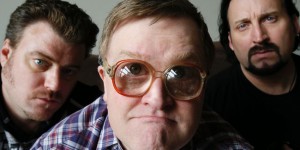Sam Roberts talks Terraform, Montreal and Gord Downie
by Kathryn Kyte
November 3, 2016
Six albums in, Quebecois troubadour Sam Roberts still gets jitters.
Photo: Paul Labonté
Sam Roberts and his band are gearing up for a new tour in support of their sixth studio album, Terraform, which sees much of the songwriting surrounded around renewal.
“Terraforming” by definition is transforming a planet to make it viable for human living. On Terraform, Sam Roberts contextualizes the term to involve the human condition, where the opportunity of reinvention and cleaning up your broken mess is there for the taking.
If you’ve followed Sam Roberts since 2000’s Brother Down, then it’s no surprise that human condition is up for discussion. But this isn’t a band about to pull you to your knees in weeping self pity – no, friends, the Sam Roberts Band is going to use their unique brand of rock to set a nice hot bath for your wounds.
Before being the pied piper of Canadian music, Sam and co. were a young band from Montreal with little awareness of music outside their own creative enclave.
“Success was undefined for us for a long period of time,” Sam Roberts tells us. “We weren’t really about being connected to any other music scene across the country. The only other scene that had some effect was Halifax as it was the ‘90s and bands like Sloan, Super Friendz, that was the crew out there. That was the one thing that was drawing me out of Montreal.”
While many bands have a checkerboard strategy when it comes to expanding their music, in the ‘90s Sam Roberts was more concerned with getting into the “weekly Montreal music rag” because that was what he knew. He didn’t really “think of Canada coast to coast.”
“Coming out of Montreal, there was this self congratulatory, self-driven music culture that basically reinforced itself, so there was no need to look outside of it,” he says.
One man that did get the guys out of Montreal was Gord Downie, who offered Roberts the best kind of exposure: touring alongside The Tragically Hip. In 2002, Sam Roberts Band set off on their first Canadian tour with a group that had quite the following in the Canada.
“When we started touring with the Hip we became exposed to Canada; we saw that it was a much wider place with pockets and distance,” he notes. “We saw how it was important to work on relating to the West coast, [and] Ontario. We became aware that you don’t just get anointed with a Canadian crown and voila, now you’re a Canadian band. You have to work regionally, and thanks to that tour we came to know that there was a wider community, and we were becoming part of that.”
It also didn’t hurt that Roberts was a big fan of The Tragically Hip, and saw them whenever they’d come through his city. “There was something undeniable about them, they had their own thing. It was something I couldn’t put my finger on either, music wise.”
While Roberts was drawn to the Hip, he also points to bands like The Grapes of Wrath and Vancouver’s 54-40 as two major early on influences on his band; his efforts were rooted in trying to learn how to sing harmonies like The Grapes of Wrath, while tapping into the darkness that 54-40 projected.
Terraform is Sam Roberts’ sixth album, but that doesn’t mean he doesn’t still get jitters. Even after 16 years, no one can be completely immune to critical opinion, nor should they be.
“That insecurity is a vital ingredient in the creative process,” said Roberts. “It has to be mixed with a sense of adventure, you have to be bold and confident in overcoming that insecurity and using the adventure to your advantage.”
Still, Roberts doesn’t let criticism cloud his creative process or his basement-dwelling songwriting setup, but his writing practice has definitely changed now that he’s a father of three.
The genre-bending and experimental 2014 album, Lo-Fantasy, was recorded in 12 days but took over a year and a half to write, whereas Terraform was written and recorded in four to five months, or as Roberts puts it: “lightning fast time.”
“The record seemed to come out faster in terms of songwriting. Being alone in the basement, writing it, seemed less laborious than last time you know? The songs were just there and I guess it depends on how you’ve been living up to that point or how clear the ideas are coming, if you have to search for them. For whatever reason this batch of songs wanted to come out.”
The shortened time frame could have also contributed to the fact that Roberts doesn’t have the same open slate he once did—kids can do that.
“I don’t have any free time anymore, and I don’t mean that in a bad way,” he laughs. “If I want to write a song, I have to do it between 9:30 in the morning and 3:30 in the afternoon. That’s my time to shine now.”
Roberts jokes about how that time frame is anything but the “rock ‘n’ roll bible,” since it’s not the ideal time you’d think the creative juices are a flowing—3AM, now we’re talking, right?
“It’s funny because I bought into that for a long time, that you shouldn’t write music unless the condition is right, but I don’t feel like that at all anymore,” he explains. “I’ve been playing music my whole life, and honestly there’s nothing like having a deadline to work with or towards. It’s far better than waiting for things to spark.”
Yet he’s quick not to dismiss the “rock n’ roll songwriting bible” mentality either.
“I don’t want to sound too unromantic about it (laughs), and I don’t want to demystify the songwriting process ‘cause there’s still history and wonder in it, but it doesn’t hurt to have a working regime in a way.”
His writing schedule has changed from night to morning (early mornings after he reads the paper of course), but this turning of the page hasn’t seemed to affect the medley of introspect that fills his latest record.
While things may change in his life, one constant that remains vital to Sam Roberts’ success is his bandmates—Dave Nugent (guitar), Eric Fares (keyboards), James Hill (bassist) and drummer Josh Trager.
“My bandmates have essentially been there since the beginning, even before anybody heard of us—like going back to high school I was playing with the same people,” Roberts says with sincerity. “They’ve come to mean a lot to me, not just because we share our lives together and we share a profession together, but in terms of who I trust as a barometer or gauge to whether I’m on the right path or not. There’s no other people in the world I look to more than my bandmates.”
Terraform is a spiritual assembly of songs, and there’s an added edge to the mix thanks to co-producer Graham Walsh of Holy Fuck. If there’s one thing to takeaway from Terraform, it might be best conveyed in the lyrics found in “FIEND”: Now and then, if we fall apart / don’t let the venom near your beating heart / it takes a lifetime to know who we are.
Tags: Music, Featured, Interviews, Sam Roberts





